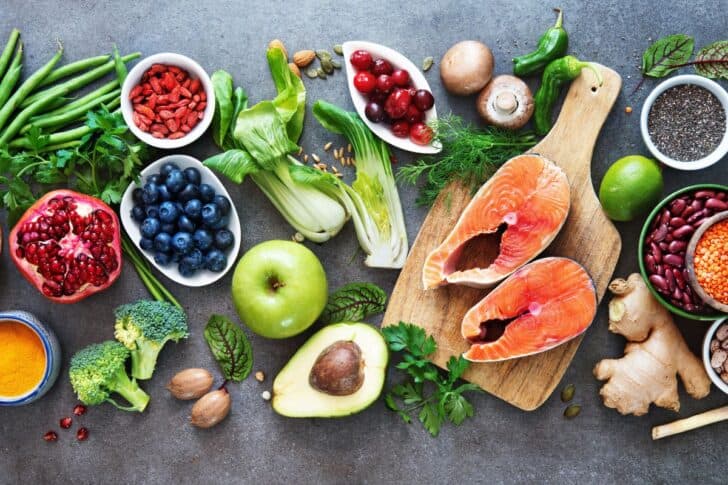The complete intermittent fasting meal plan guide 18/6
Back in the day when I was young, breakfast was considered to be the most important meal of the day. And still to this day there are quite a few people who still think that skipping breakfast is a no go. The first time I heard about intermittent fasting must have been around the same time I discovered paleo. I quickly found out that the basic concept of intermittent fasting is that there is a fasting period during which you eat nothing.
Sounds pretty simple right? The good news is that it really is. I did dig a little deeper into the ins and outs and the health benefits of intermittent fasting.

What exactly does it entail?
For starters, intermittent fasting is not a diet. It is more of a lifestyle or something you can do temporarily. You don’t change your eating pattern but you do change when you eat. In general, there are a few ways to do intermittent fasting.
5:2 method
You choose one or two fasting days per week and on those days you eat no more than 500 kcal. The rest of the week you eat as normal.
16:8 method
You eat nothing for 16 hours a day and then eat normal during an 8-hour window. This may sound complicated but it is not. Suppose you eat dinner around six/seven. That’s your last meal of the day. The next morning you skip breakfast, but drink well (coffee, tea, water) and only at lunch you take your next meal. You then haven’t eaten anything for 16 hours. There are several variations that can be made on the 16:8 method. You could switch it to 18:6 so you eat during a 6-hour window.
Alternate days
You don’t eat anything for 24 hours and eat normal the next day.
Longer fasts
Once you get the hang of it, you can try longer fasts of up to 48 hours or even more. I would definitely not start with that. I have tried 24 hour fasts and find it challenging (and somewhat boring) to not eat for an entire day. Works wonders for my body weight so I do incorporate one every once in a while but it is definitely not my favorite form of intermittent fasting.

What are the advantages?
One very big advantage is that it is very simple. I just started it so I can’t say what other advantages there are. I find breakfast delicious but sometimes difficult when you want to eat few carbs and no dairy. So not eating is very easy. I don’t have to think about breakfast and can hop on to lunch.
According to research that has been done IF makes you live longer
Your insulin levels drop so you start burning more fat and it’s beneficial on your blood sugar levels and will improve insulin resistance.
Your body has more time to repair itself since it doesn’t have to burn food. (increasing autophagy)
You are likely to lose weight, mainly belly fat. Moreover, intermittent fasting seems to increase your metabolism slightly
You get more energy.
It also seems to be good for your brain and help prevent diseases such as Parkinson’s and Alzheimer’s disease.
It inhibits the development of heart disease.
You will start to burn more fat since your body will have to make the metabolic switch from burning carbs to burning fat if no carbs are coming in.

How to start
First of all you will have to pick your fasting window. I prefer to do a 16:8 eating period. I stop eating around 8 pm in the evening and don’t eat anything before 12 the next day. Instead of still eating three meals I like to stick to 2 meals on those days. That automatically reduces the calorie intake. That alone is a good reason to try this. My energy levels are really good during the morning. It might take some getting used to in the beginning. If you feel you get really hungry or are feeling dizzy you might want to start slow by adding a little snack in between and working your way up to a total of 16 hours fasting period. Keep in mind that you’ll also be sleeping during those 16 hours. So it might sound like a lot but it is not as bad.
If you think you will have a hard time sticking to an 16-hour fast or an 18-hour fast you can start slowly by using 12:12. So you stop eating for 12 hours and eat for 12. You could stop eating at 8 pm and continue eating again the next day at 8 am. If that goes well you can progress to 14:10 and so on.
Metabolic flexibility
Another thing that intermittent fasting promotes is the fact that you will become more metabolically flexible. IF is definitely a way to use calorie restriction, as people do eat few calories during the shortened eating window. This promotes caloric efficiency. What that means is that your body will become better at dealing with fewer calories. Keep in mind that our ancestors had to do with whatever was available. That might have meant abundance in the summer period with lots of fresh fruits and a good supply of meat, but during the winter months food must have been scarce. When you are metabolically flexible you will be able to deal with the varying supply of calories. In today’s terms; if you have a long flight you can easily do without the horrible in-flight meals and do without food for a prolonged period.
In addition to that during fasting the hormones that regulate growth, repair and your immune function are optimized since insulin is low. There is no need for your body to produce insulin if there is no food coming in. It will also increase your insulin sensitivity and increase your levels of human growth hormone.
Is there a downside to intermittent fasting?
While in general intermittent fasting will improve your overall health, in the beginning it can be challenging. If you currently eat a diet high in processed carbs and eat maybe 3 big meals and several smaller meals a day; starting with intermittent fasting might give you temporary headaches, nausea, tiredness or insomnia. While that sounds less than fun those are usually temporary symptoms. If you have doubts if IF is for you, it is best to consult with your doctor prior to starting an intermittent fasting plan.
Depending on your life, your work and your family it might also be really hard to stick to the schedule. Meal times can vary and it might not fit into your healthy lifestyle.
It is also not suitable for people with an eating disorder, people that are pregnant or breastfeeding and in general if you have a medical condition it is always safest to check with your doctor.
Also it’s not a religion; if you feel you want to choose 16:8 as your intermittent fasting period, there is no police telling you that it MUST be every single day. I tend be really flexible with my schedule. Typically I follow intermittent fasting for 3 to 4 days a week and eat three meals for the remaining days. Sometimes I pick another intermittent fasting method or I don’t do it all for a period of time. In the end it all comes down to being metabolic flexible and not getting hung up on the how and when.

What to eat?
While in theory when to eat is the main driving factor during any intermittent fasting schedule, it is also still important to watch what you’re eating during the eating window. Especially if the reason you are embarking on this journey is weight loss. You want to make sure to stick to healthy fats, good lean protein and complex carbs. Definitely whole foods and nutrient-dense foods.
A good starting point would be the below meal plan on an intermittent fasting day:
Breakfast
Obviously no breakfast but stick to black coffee, herbal tea, black tea and water. Basically anything without any calories.
Lunch
Your first meal of the day! A good choice would be:
Scrambled egg bowl with mushrooms, avocado, eggs and tomatoes
Low carb meal with eggs, avocado
Dinner
Go for something that will fill you up nicely to keep going till 12 the next day. An example would be:
If you struggle to stick to the two meals a day it is fine to add a third meal as long as you stay within the eating window. For best results two meals would be ideal but it’s also important to get all the essential nutrients. If you feel you need three meals to do just that go for it. Add something like a bowl of Greek yogurt as your first meal of the day.
Will you lose weight during intermittent fasting?
There are no guarantees as it does depend on what you eat during your eating window but in general people that start with intermittent fasting will lose weight. There are too many variables to give a prediction on what you will lose but it’s likely that body fat will decrease since your body will be in a fat burning state for a longer period of time.
My Experience
I’ve been using intermittent fasting for quite a few years now on most days of the week. It has improved my blood pressure and in general my food intake. Starting with any healthy diet can take some getting used to so stick to the slower schedules to start with and give yourself a decent time period to get used to eating less and on less number of days.
You cannot escape feeling hungry in the beginning. You have to get through that. It took me 5 days to get used to the shorter eating window and after that I felt totally fine. If I have a period where I do eat breakfast (as I just had) it does take me some time to get back into the swing of things. Like mentioned my personal preference is the 16:8 method and I do believe it has helped me a great deal in maintaining body weight. It’s been a weird last couple of months so I have to get back into the diet plan. You can follow along here if you’re interested in my weekly meal planning.
Sources:

Hello Simone! My option is 16:8 and it was difficult at the beginning but now I am used to it and feel so much better! must admit, our extremely hot summer helped a great deal but luck supports the brave ones, right? 🙂